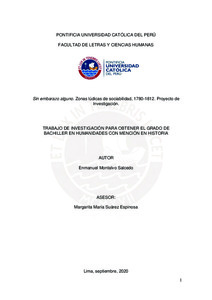Sin embarazo alguno. Zonas lúdicas de sociabilidad, 1780-1812. Proyecto de Investigación
Abstract
La relativa heterogeneidad del grupo que llevó a cabo las reformas borbónicas en el
virreinato del Perú tuvo su correlato en el resultado desigual que estas tuvieron. Este
trabajo pretende acercarse a esta realidad a partir de un caso concreto: los espacios de
sociabilidad. Se sostiene que las reformas culturales que buscaron simultáneamente
reordenar el espacio urbano y atacar las “bárbaras costumbres de la plebe” fueron un
proyecto inacabado, debido principalmente a esas variaciones del discurso de la élite y
las dificultades prácticas que estas tuvieron para implantarlas. Estas formas de
sociabilizar asociadas a espacios particulares como chinganas o pulperías se
configurarían nuevamente en una ciudad que había desplazado, más no soslayado, esos
espacios de interacción entre múltiples grupos sociales. The relative heterogeneity of the group that carried out the Bourbon reforms was
correlated by the uneven result they had. This work tries to approach this reality from a
concrete case: the spaces of sociability. It is argued that the cultural reforms that
simultaneously sought to reorder the urban space and attack the "barbarous customs of
the common people" were an unfinished project, mainly due to these variations in the
elite discourse and the practical difficulties they had to implement them. These forms of
socializing associated with particular spaces such as chinganas or grocery stores would
be configured again in a city that had displaced, but not ignored those spaces of
interaction between multiple social groups.
Temas
Perú--Historia--Siglo XVIII--Aspectos sociales
Perú--Vida social y costumbres--Siglo XVIII
Perú--Vida social y costumbres--Siglo XVIII
Para optar el título de
Bachiller en Humanidades con mención en Historia
Collections
The following license files are associated with this item:






